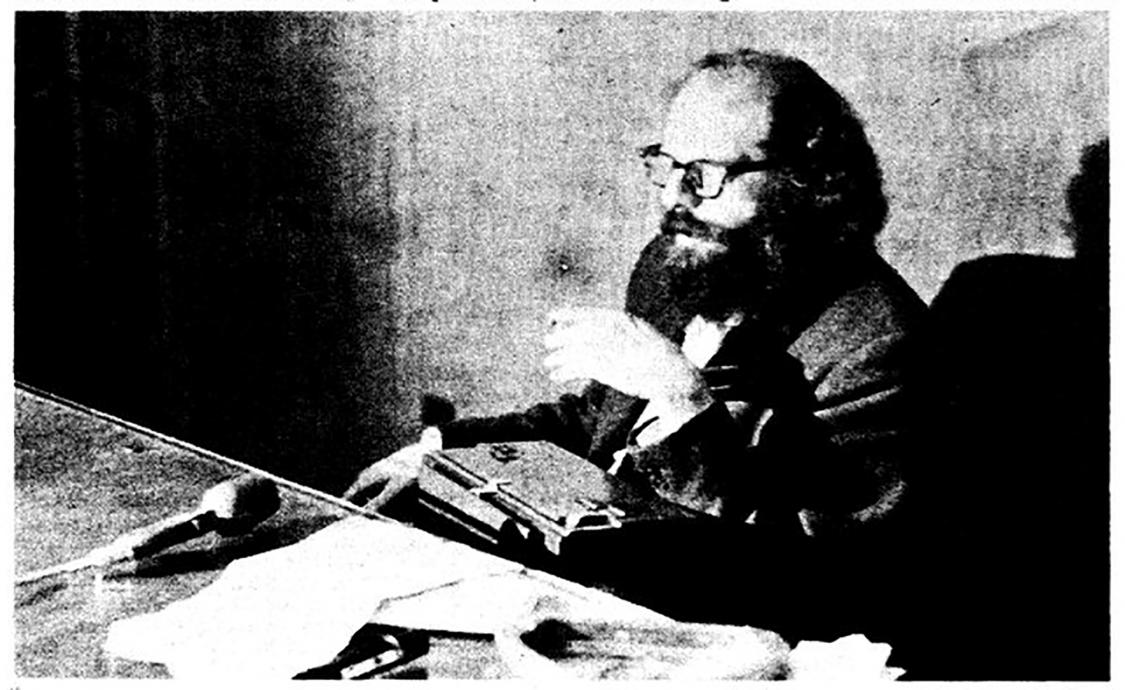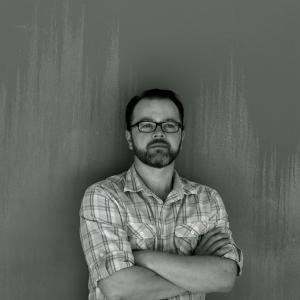How a previously unpublished poem by Allen Ginsberg founds its way into NAR's pages
In 1968 Kennie Harris was a student at the University of Northern Iowa. She worked part time off campus as a reporter for the Cedar Falls Record. The young editor, Jim Walde, was a thin, quiet man, an odd guy, as Kennie remembers him, always nervous and seemingly uncomfortable. One cold February day, Jim returned to the office from a trip through Chicago. The poet Allen Ginsberg had been aboard his plane, he told her, and had written a poem on the short flight from Appleton, Wisconsin, to O’Hare, which he then bestowed upon Jim. Kennie was an English major, he knew, so he gave the poem to her, a thoughtful gift casually given. It was scribbled in red ink on a sheet of loose leaf notebook paper. She kept it, filed it away, and then more or less forgot that it existed...
… until three months ago, when Kennie sent an email to the editors of a magazine produced at her alma mater. Right around the same time Ginsberg wrote his poem fifty years ago, UNI purchased the North American Review for $10,000 from Cornell College, where it had been edited by the poet Robert Dana since 1964. Now assistant professor Robley Wilson was selected as its new editor and would remain so until 2000, when he retired from the university. Kennie had known Robley and remembers him fondly: “He was my writing advisor for a while, poor man.” She recalls that he kindly allowed her to receive college credit for her high school English class, “for being able to put together a sentence, not for the sophistication of my thoughts at the time.” Kennie went on to work as an editor herself for a college textbook publisher in Dubuque, Iowa.
And now she was writing to the NAR about this unpublished poem, “Vroom — Over White Wisconsin,” which had only ever been seen by a handful of people. Maybe it would be of some literary interest. “Recently I’ve been thinking that I should pass it on,” she wrote to us, “but to whom? Would you have any suggestions?” Indeed, we did have a suggestion, namely allowing us to publish the poem in our pages and sharing it (and its history) with the world.
Reproduced in our Summer, 2019 issue, in facsimile and transcription, is Ginsberg’s 23-line poem describing the flyover landscape of the midwest, its farmland, the great lake, the Chicago sky, O’Hare. He briefly recounts a strange event that had taken place the previous morning at St. Mary’s Cemetery on the banks of the Fox River. The controversy had attracted national media attention: an exorcism performed at the grave of Joseph McCarthy to release the spirit of the homophobic, red-baiting senator.
In Appleton, along with a large group of about seventy-five students from Lawrence University, Allen Ginsberg, Ed Sanders, Tuli Kupferberg, and the other members of The Fugs, who he’d appeared with the night before at the Cinderella Ballroom, performed what Sanders called “a witty ceremony” lasting about eleven minutes. “We asked those present at the Exorcism to place a gift on Mr. McCarthy’s stone,” explains Sanders in his history of The Fugs, Fug You. “I looked back as we left and saw a very interesting visual gestalt atop the granite: a bottle of Midol, a ticket to the movie The War Game, a Spring Mobilization Against the War leaflet, a stick of English Leather cologne, one stuffed parrot, one candy bar, a chap stick, one dozen red roses, one dozen white geraniums, one dozen yellow geraniums, one ‘Get Fugged’ button, some coins, sugar wafers, coat buttons and two seeds of marijuana. ‘So long, Joe,’ Tuli said as we walked down the hill.”
From Chicago, Ginsberg flew to Iowa, where he held an impromptu press conference at the Waterloo airport before his three-day visit at UNI. The news agency United Press International (UPI) had reported on the exorcism, and the story was mentioned disparagingly by Paul Harvey on his radio program, accusing Ginsberg of vandalism and desecration, claiming that the group had spit on the senator’s grave, written obscenities on the gravestone, and “chanted indignities.” But Ginsberg explained to the reporters gathered in the airport conference room that their intention was “to neutralize his demonic influence and to bring his phantom back from the hell world.” It was an earnest ceremony and not, as suggested in media accounts, a joke.
Ginsberg would give two public readings and visit fourteen classes in Iowa, including one taught by Iowa’s own farmer-poet James Hearst, which UNI alum Dave Meyer vividly recounts in his poem “The Fellowship of the Living and the Dead” on page 60. Hearst himself later recalled Ginsberg playing tapes of Ezra Pound for him from the recordings he’d made in Italy the year before. While in Cedar Falls, Ginsberg would also write the anti-war poem “Genocide,” which describes an erotic dream about Amiri Baraka (then LeRoi Jones). “What will happen / to me Leroi?” he asks, “I may / perish for all this War / in America.” Like many in the country at the time, Ginsberg could feel
the great force that
was upon us, of strangeness and
alien white mind in America,
rising from Iowa, Kansas,
Nebraska, Wisconsin, Brooklyn.
This “alien white mind in America” of violence and oppression still haunts us half a century later, taking on different forms but remaining potent as ever. It’s hard to imagine a single solution to such a complicated problem, but the occasion of “Vroom — Over White Wisconsin” suggests a good start: exorcising the past, recognizing historical suffering as an ongoing phenomenon, and creating a restorative work of art. Ginsberg wrote this poem quickly and then bestowed it as a gift upon a stranger, Jim Walde, who bestowed it as a gift upon a friend, Kennie Harris, who then bestowed it as a gift upon us, the North American Review, who now bestows it upon you to do with what you will. We invite you to read the poem, to reflect upon our shared history, and then remove it from these pages to bestow again upon another in the spirit of gift-giving that is the life of poetry.
Recommended
Nor’easter
Post-Op Appointment With My Father
Cedar Valley Youth Poet Laureate | Fall 2024 Workshop






